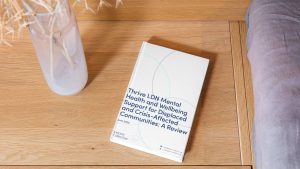
Meeting the needs of communities affected by displacement, conflict and crisis
Thrive LDN’s Katasi Kironde shares her reflections of a recent community engagement and listening project to support Thrive LDN’s community resilience and crisis response work.
I’m currently leading across Thrive LDN’s community resilience and crisis response workstreams.
Between March and May, Thrive LDN worked alongside Peace Collective to take a closer look at how communities affected by displacement, crisis and conflict are accessing and using mental health and crisis response resources in London, and exploring why some might not be.
The work was facilitated by Peace Collective and involved interviews, focus groups, and a review of existing digital resources. It drew on conversations with community organisations, faith groups, mental health practitioners, educators, and individuals with lived experience. We are grateful to the Peace Collective team for their thoughtful and sensitive work on this project.
This is a difficult and emotional time for many communities across London with the unpredictability of ongoing conflicts and what’s to come. The report acknowledges and highlights the challenging context many are facing. It also reinforces the immense pressure being felt by the voluntary, faith, and community sector organisations that provide essential support.
The review has provided a valuable evidence base for how we can adapt and improve our resources. Read the full report on the Thrive LDN website.
Key findings from the report include:
- Supporting the supporters: The report highlights a deep fragility within the voluntary and community sector. Many organisations are under-resourced and facing capacity constraints, which affects their ability to provide consistent care. Any approach to improving mental health support must also focus on sustaining the organisations and informal networks that people Londoners rely on.
- Meeting people where they are: For many communities, mental health support does not happen in a formal or clinical setting. It happens in everyday, trusted spaces through shared meals, a conversation after prayer, a community walk, or in a group chat. The report emphasises the need to meet people where they already are, embedding support within these informal settings rather than always expecting people to find and navigate formal systems first.
- Making tools practical and relevant: While practitioners find Thrive LDN’s resources valuable, they shared that it can be challenging to apply them without clearer, context-specific guidance. The report recommends developing more support for frontline workers, such as teachers and community leaders, to help them adapt tools for their specific settings and build confidence in holding supportive conversations.
- Reducing complexity and overload: The process of navigating systems such as asylum, benefits, or housing can be confusing and disempowering, which can compound distress and re-trigger trauma. The report found there is clear value in resources that provide practical clarity and calm guidance. It also highlighted that accessibility is about more than just availability; resources must be in formats that are easy to use and share, such as mobile-friendly graphics, and use language that is culturally relevant and avoids clinical terms and jargon.

While the report focuses on the experiences of crisis-affected communities, its findings offer important principles for anyone working to support the wellbeing of Londoners. The insights have been valuable in helping us reflect on the pressures our partners face and how we can better adapt our work to support them.
I encourage our partners and all those interested in community wellbeing to read the report. I look forward to Thrive LDN considering these recommendations in our community resilience and crisis response work going forwards.